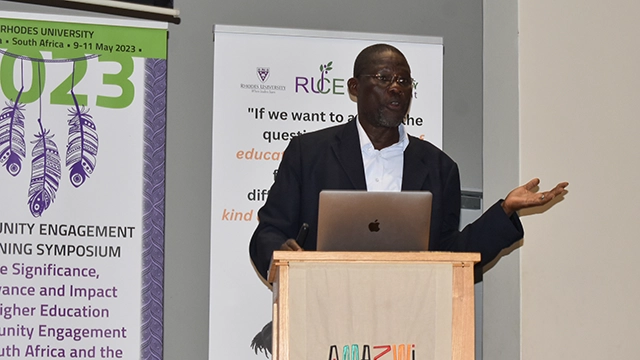
By Nwabisa Moyo
Community Engagement is not a new concept, as it has played a significant role in society over the years. However, its formalisation as a core function of universities is relatively recent. Community engagement helps universities to contribute to the socio-economic development of local communities. The Community Engagement Learning Symposium, held from 9 to 11 May 2023 and organised by Rhodes University Community Engagement (RUCE) division, had a stimulating group of keynote speakers and many thought-provoking presentations from Community Engagement representatives (academics, students and community partners) based on the four themes of the Symposium.
On the third day of the Symposium, Professor George Openjuru, the Vice-Chancellor of Gulu University and Chair of the Uganda Vice-Chancellors Forum, was the final keynote speaker whose topic was the Status and Significance of Higher Education Community Engagement in Africa. His presentation highlighted the development role of universities in the context of local communities. Universities had a dual social responsibility function- to their students and to the local communities.
Prof Openjuru stated that universities' strong relationship with communities and their commitment to community engagement was imperative. He said, "Many universities in a number of African countries were established as a response to community needs and to contribute to solving some well-defined community problems."
Prof Openjuru added that Community-University Engagement is not new in Africa. As an example, he said that community engagement started at Makerere University in 1953. Since then, such engagements have entered into and continue to exist in many African universities. The concept of Community University Engagement emphasises the importance of universities working together with their surrounding communities to address local challenges.
These partnerships between communities and universities provide research opportunities that address pressing social issues. They facilitate the co-creation of knowledge, which is mutually beneficial. Partnership relationships hold importance in society because it helps to identify burning issues within communities, improve the university curriculum, ensure students' employability, and promote social justice and sustainable development.
Additionally, Community-University Engagement can be used to enhance the relevance of academic research, ensuring that it is more responsive to community needs and concerns. Prof Openjuru stated, "If the university and the community are to exist organically, it means that the university must be immediately relevant to the community."
Prof Openjuru emphasised that graduates must be encouraged to give back to their communities upon attaining their degrees. He said, "Our graduates must be able to develop our society, not to leave our society or communities. They should know how or try to improve our local communities."
Prof Openjuru further stated that universities are meant to advance people and communities, ensuring a sense of improvement within them. Although the idea of Community University Engagement has existed for many years, its relevance never ceases. Each year, the partnerships between universities and communities become more significant, as this remains one of the best ways to ensure the improvement of community well-being.

